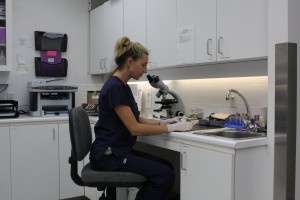Laboratory Testing
In order to provide proper care and treatment for your pet your veterinarian may need to do further testing. Depending on the problem and your veterinarian’s tentative diagnosis, the testing may be done either in hospital or sent out to the lab.

In House
 One of the in house tests most people will be aware of is a fecal flotation- a routine test that checks for internal parasites- but there are many other stool sample tests that we can run right here on site. Depending on a doctor’s tentative diagnosis we may run a fecal smear, a fecal floatation, or a SNAP Giardia test to name a few. Each of these tests are used to determine what organism could be causing the clinical signs, but even a negative test is useful as it can rule out a potential diagnosis.
One of the in house tests most people will be aware of is a fecal flotation- a routine test that checks for internal parasites- but there are many other stool sample tests that we can run right here on site. Depending on a doctor’s tentative diagnosis we may run a fecal smear, a fecal floatation, or a SNAP Giardia test to name a few. Each of these tests are used to determine what organism could be causing the clinical signs, but even a negative test is useful as it can rule out a potential diagnosis.
Urine specimens can also be run in hospital as a full urinalysis, a urine specific gravity, or a chemical strip depending on the doctor’s discretion. Please pay careful attention to your veterinarian in regards to what time they need urine collected and to be sure and collect it in a clean container as well as keep it refrigerated until the sample is brought into the clinic for accurate results.
In hospital blood tests can include blood glucose spot checks (individual tests) and full blood glucose curves along with SNAP FelV/FIV, Parvo, and Heartworm testing . As well
we can do packed cell volume and total protein tests in clinic.
Cytology testing can include ear and skin smears to check for infection but also includes testing such as skin scrapes, fungal cultures, and tape tests.
Referred
Because of our partnership with various laboratories we are able to offer a wide variety of testing options. We use these laboratories to acquire certain blood panels, vaccine panels, vaccine and viral titres, histology, advanced urine testing, along with cultures. Most results will be received within 48 hours. We also have working relationships with pathologists, export laboratories, and DNA testing laboratories for other more specific tests. Your veterinarian uses the information received through testing as a crucial step in helping diagnose, treat, and monitor your pet’s condition.
Our Services
- Anesthesia and Patient Monitoring
- Boarding
- Diagnostic Imaging
- Dentistry
- Emergency and/or Extended Care
- Euthanasia and Cremation
- Health Screening Tests
- Laboratory Testing
- Laser Therapy
- Medical Services
- Parasite Control
- Pharmacy
- Surgical Services
- Vaccination Programs
- Veterinary Specialist Referrals
- Other Services
